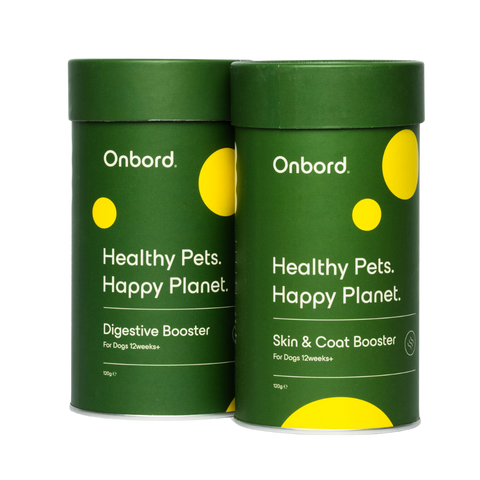✅ Covers puppies, adults & seniors • Natural foods & supplements • Science-backed UK advice
Dog Nutrition: The Ultimate Guide to Supporting a Healthy and Happy Life
Quick Navigation
- Understanding a Balanced Diet
- Essential Vitamins & Minerals
- Multivitamins & Joint Care Boosters
- Hydration in Nutrition
- Sustainable Superfoods
- Nutritional Mistakes to Avoid
- Toxic Foods List
- Eco-Friendly Feeding
- Customising Nutrition
- DIY Dog Nutrition
- Conclusion
Ensuring your dog’s nutrition is balanced and eco-conscious is one of the best ways to support their health, happiness, and longevity. Whether you’re an experienced dog owner or just starting your journey, understanding the essentials of dog nutrition can help you make informed, sustainable choices that benefit both your pet and the planet.
This guide delves into the key aspects of dog nutrition, including sustainable superfoods, supplements for joint health, and eco-friendly feeding practices, all tailored to ensure your furry friend thrives.

1. Understanding a Balanced Diet for Dogs
A balanced diet provides the foundation for your dog’s overall well-being. It includes the right mix of proteins, fats, carbohydrates, and fibre, alongside essential vitamins and minerals.
- Proteins: Vital for muscle development and body function. Eco-friendly sources: lentils, chickpeas, quinoa, lean chicken, fish (Vitamin B12, Omega-3s).
- Fats: Healthy fats like flaxseed, coconut oil, and fish oil give energy, support brain function and a shiny coat, and help reduce inflammation.
- Carbohydrates: Energy and digestion. Best sources: sweet potatoes, brown rice, oats.
- Fibre: For gut health. Found in carrots, spinach, pumpkin, and keeps digestion healthy.
2. Essential Vitamins and Minerals
Vitamins and minerals are critical for maintaining your dog’s physical health. Here are some key nutrients and their eco-friendly sources:
- Calcium & Phosphorus: Leafy greens, fortified foods – strong bones and teeth.
- Iron: Spinach, beans, some animal products – oxygen transport in blood.
- Zinc: Seeds, whole grains, eggs – healthy skin, strong immunity.
- Vitamin A: Carrots, sweet potatoes – vision, immune health.
- Vitamin E: Sunflower seeds, leafy greens – antioxidant, immune support.
- B Vitamins: Whole grains, legumes, animal proteins – energy, metabolism.
3. Multivitamins and Joint Care Boosters

Sometimes diet alone isn’t enough. Supplements, especially for joint health, are beneficial:
- Multivitamins: Fill gaps in diet and help with issues like joint care. Look for eco-conscious, additive-free options.
-
Joint Care Supplements:
- Glucosamine & Chondroitin: Repair cartilage, improve mobility.
- Omega-3s: Flaxseed, fish oil – reduce inflammation, support joints.
- MSM: Natural compound for joint flexibility.
- Turmeric: Natural anti-inflammatory for stiffness, arthritis (common in senior dog vitamins).
Sustainable packaging and plant-based supplement options are available.
4. Hydration and Its Role in Nutrition
Clean, fresh water is as important as food. Hydration impacts digestion, joint health, and energy. Use spill-proof or self-refilling bowls to keep water available at all times.
5. Sustainable Superfoods for Dogs
Add superfoods for a nutrient boost:
- Chia Seeds & Flaxseeds: Omega-3s, fibre for heart, skin, and coat.
- Blueberries: Antioxidants for brain and immune health.
- Pumpkin: Fibre, beta-carotene for digestion and immunity.
- Seaweed: Iodine, trace minerals for thyroid.
- Turmeric: Anti-inflammatory properties.
6. Common Nutritional Mistakes to Avoid
- Overfeeding → obesity & health issues.
- Feeding toxic foods (chocolate, onions, grapes, etc).
- Ignoring portion control and dietary balance.
Below is a list of foods that dogs should never eat.
Can Dogs Eat:
- Chocolate: Toxic – contains theobromine and caffeine.
- Grapes/Raisins: Can cause kidney failure.
- Onions/Garlic: Damages red blood cells.
- Macadamia Nuts: Vomiting, tremors, weakness.
- Xylitol: (in gum/sweets) – can cause liver failure.
- Alcohol: Even small amounts are poisonous.
- Caffeine: (coffee, tea, energy drinks) – dangerous.
- Cherry Pits & Stone Fruit: Choking/cyanide risk.
- Apple Seeds: Avoid – cyanogenic compounds.
- Citrus Peels/Leaves: Stomach upset/vomiting.
- Tomato Leaves/Stems: Solanine is toxic.
- Salted Snacks: Excess salt = sodium poisoning.
- Mouldy/Spoiled Food: Harmful toxins.
- Yeast Dough: Expands, can cause pain or complications.
- Hops: (beer brewing) – organ failure risk.
- Nutmeg: Can cause seizures.
- Raw/Green Potato: Solanine toxicity.
- Ice Cream (Sugar-Free): Xylitol and lactose issues.
- Gum/Mints: Xylitol toxicity.
- Peach/Plum Pits: Choking/cyanide.
- Baking Powder/Soda: Electrolyte issues.
7. Eco-Friendly Feeding Practices
- Choose eco-friendly, responsibly sourced, or plant-based brands.
- Use biodegradable bowls/storage to reduce plastic waste.
- Avoid meat-heavy diets for a lower carbon pawprint.
8. Customising Your Dog’s Nutrition
Every dog is unique. Tailor diets by:
- Age: Puppies = high calorie. Seniors = lower calorie + joint support.
- Size/Activity: Big, active dogs need more energy.
- Health: Allergies/sensitivities = grain-free or limited-ingredient diets.
Consult your vet for a plan tailored to your dog.
9. DIY Dog Nutrition: Homemade Recipes
Homemade meals are a sustainable, healthy option:
- Balanced Recipes: Protein, fibre, carbs (lentils, quinoa, carrots, sweet potato).
- Supplement Safely: Add multivitamins/calcium for completeness.
- Organic Treats: Try frozen banana/pumpkin bites or oat/peanut butter biscuits.
10. Conclusion: Sustainable Nutrition for a Healthier Dog
Dog nutrition goes beyond just feeding; it’s about building a balanced, sustainable diet that supports long-term health. By choosing eco-friendly foods, adding supplements, and avoiding mistakes, you help your dog thrive.
Ready to Support Your Dog’s Health?
Explore our UK-approved dog vitamin supplements to help your dog thrive from puppyhood to senior years.





